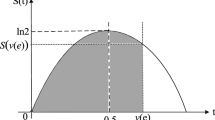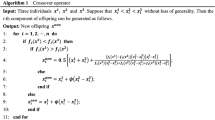Abstract
Securities market is a complex system. In the actual asset allocation decision-making process, people often face the double uncertainty environment where randomness and fuzziness coexist. Based on fuzzy random theory it discuss asset allocation problem in fuzzy random environment following the thought of mean-variance model made by Markowitz. Assuming every future return rate is LR-type fuzzy random variables, these three objectives which are return, risk and liquidity are scribed as the fuzzy expected rate of return, fuzzy random yield variance and the determinate possible average value of random exchange rate. Set up multi-objective asset allocation model with complex constrains under the fuzzy random environment, based on some additional conditions which are generated possibly in the practical investment activities with genetic algorithms compromise designing model, use its solving the way, and illustrate multi-objective asset allocation model with complex constrains is feasible through the operator example.
Access this chapter
Tax calculation will be finalised at checkout
Purchases are for personal use only
Preview
Unable to display preview. Download preview PDF.
Similar content being viewed by others
References
Katagiri, H., Ishii, H.: Fuzzy portfolio selection problem. In: IEEE SMC 1999 Conference Proceedings, vol. 3, pp. 973–978 (1999)
Kwakernaak, H.: Fuzzy random variables-definitions and theorems. Information Science 15, 1–29 (1978)
Qi, Y., Steuer, R.E., Hirschberger, M.: Multiple objectives in portfolio selection. Journal of Financial Decision Making 1(1), 11–26 (2005)
Qi, Y., Steuer, R.E., Hirschberger, M.: Suitable-portfolio investors, nondomi-nated frontier sensitivity, and the effect of multiple objectives on standard portfolio selection. Annals of Operations Research 152(1), 297–317 (2007)
Markowitz, H.: Portfolio selection. Journal of Finance 7, 77–91 (1952)
Puri, M.L., Ralescu, D.A.: Fuzzy random variables. J. Math. Annal. Appl. 114, 409–422 (1986)
Campos, L.M., Gonzalez, A.: A subjective approach for ranking fuzzy numbers. Fuzzy Sets and Systems 29, 143–153 (1989)
Korner, R.: On the variance of fuzzy random variables. Fuzzy Sets and Systems 92, 83–93 (1997)
Yong, F.: Fuzzy Portfolio Optimization. Institute of Systems Science, Chinese Academy of Sciences (2003)
Fuller, R., Majlender, P.: On weighted possibilistic mean and variance of fuzzy numbers. Fuzzy Sets and Systems 136, 363–374 (2003)
Streichert, F., Ulmer, H., Zell, A.: Evolutionary algorithms and the cardinality constrained portfolio selection problem. In: Ahr, D., Fahrion, R., Oswald, M., Reinelt, G. (eds.) Operations Research Proceedings 2003, Selected Papers of the International Conference on Operations Research (OR 2003), pp. 253–260. Springer, Berlin (2003)
Ulmer, H., Streichert, F., Zell, A.: Evaluating a hybrid encoding and three crossover operations on the constrained portfolio selection problem. In: Congress of Evolutionary Computation (CEC 2004), Portland, Oregon, USA, pp. 932–939. IEEE Press, Los Alamitos (2004)
Zeleny, M.: Compromise programming in multiple criteria decision making. In: Cochrane, J.L., Zeleny, M. (eds.) University of South Carolina Press, Columbia (1973)
Xuan, G.N., Cheng, R.W. (Yu Jie, Zhou GG translation): Genetic Algorithms and Engineering Optimization. Tsinghua University Press (2004)
Gen, M., Cheng, R.: Genetic Algorithms & Engineering Optimization. John Wiley & Sons, New York (2000)
Liu, S.C.: Excel in the financial model analysis. Posts Telecom Press, Beijing (1994)
Tanaka, H., Guo, P., Turksen, I.B.: Portfolio selection based on fuzzy probabilities and possibility distributions. Fuzzy Sets and Systems 111, 387–397 (2000)
Liu, B.D., Zhao, R.Q., Gang, W.: Uncertain Programming with Applications, vol. 8, pp. 224–240. Tsinghua University Press (2003)
Author information
Authors and Affiliations
Editor information
Editors and Affiliations
Rights and permissions
Copyright information
© 2009 Springer-Verlag Berlin Heidelberg
About this paper
Cite this paper
Guo, Yq., Lu, Sc. (2009). The Research of Multi-objective Asset Allocation Model with Complex Constraint Conditions in a Fuzzy Random Environment. In: Cao, B., Li, TF., Zhang, CY. (eds) Fuzzy Information and Engineering Volume 2. Advances in Intelligent and Soft Computing, vol 62. Springer, Berlin, Heidelberg. https://doi.org/10.1007/978-3-642-03664-4_149
Download citation
DOI: https://doi.org/10.1007/978-3-642-03664-4_149
Publisher Name: Springer, Berlin, Heidelberg
Print ISBN: 978-3-642-03663-7
Online ISBN: 978-3-642-03664-4
eBook Packages: EngineeringEngineering (R0)




